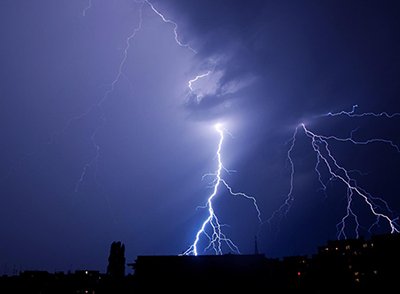Heating and cooling emergencies happen when you least expect them. The experts at C.B. Lucas will assess and handle any emergency HVAC or plumbing issues in your home or business. We have the necessary skills and tools to fix your system so you can safely use it once again. Call C.B. Lucas to get 24/7 emergency HVAC & plumbing services in Northern Virginia and the surrounding areas.
Protect External Air Conditioning Components From Storms
Spring and summer weather patterns are on the way, despite the oddly icy winter Virginia just experienced. That means you have to prepare your outdoor spaces for the weather, including preparing your air conditioner compressor or exterior portions of wall and window units.
These components aren’t exactly fragile. But the severe weather that Virginia sometimes experiences can ruin those components if you aren’t careful. Seasoned Virginia homeowners will know what to do, but those new to the region and those moving out on their own for the first time may need more information.
Rain Is OK
First, rain itself is not the problem. Any portion of an air conditioning system that sits outside should be manufactured to withstand expected weather phenomena. If the exterior half of a wall air conditioner is out in the rain, for example, the unit should be able to handle that if it was made and installed properly.
If you’re really nervous about a heavy storm or just don’t want to deal with cleanup (because you know that rain will bring downed leaves), you can buy covers for exterior components. These range from complete hoods that sit over compressors to covers for window and wall units.
Flooding Is Another Matter
Of course, if it rains so much that the region floods, or if a hurricane hits, then the components could be damaged. Virginia is no stranger to hurricane flooding, such as the flooding from Hurricanes Agnes and Gaston in 1972 and 2004, respectively. Nor is it immune to flooding from the remnants of storms, such as that from Hurricane Camille in 1969.
Flood waters can seep through connections and small openings in casings. Stagnant flood waters that don’t recede for a long time can contribute to corrosion, especially on older units.
Exterior compressors may benefit from secure covers, but unless you tape the whole cover down so that there are no openings, the covers may still not keep out flood waters. In that case, once the flood subsides, you should not use your air conditioner until you have the compressor inspected and cleared.
Window and wall units are usually up a little higher. Some wall units are located toward the ceiling, but many are below windows. Major flooding requires the same response as it does for compressors. Minor flooding that doesn’t really reach the unit can still affect the wall and wiring, and the water can seep inside through points around the units.
Again, you can buy covers and seal them as much as possible. But you still need to have the unit inspected to be on the safe side. Don’t mess with water and wiring.
Wind Can Go Horizontal
Another issue is wind, which can drive rain horizontal in strong storms. These winds can also send debris flying into the sides of the units, clogging filters. There are soft covers available that you can use (basically the same as the ones to cover units facing rain); place these over units that are not in use.
However, those covers won’t help you if you’re home and need to use the air conditioner. In those cases, a barrier that sits away from the unit but that blocks wind is best. Shrubs with good root systems or a small but sturdy fence could both work.
Hail Is a Problem
Virginia gets large hail. In fact, a storm in May 2017 sent tennis ball-sized hail into central Virginia. You can buy metal covers for exterior compressors, and you may want to check with air conditioner installers about what they might offer and what size of hail the covers can withstand.
If you’re new to the region or new to living on your own, contact an air conditioning company like C.B.Lucas Heating & Air Conditioning. Set up a time for an evaluation and find out what types of protection for the components would work best for you.
Virginia gets large hail. In fact, a storm in May 2017 sent tennis ball-sized hail into central Virginia. You can buy metal covers for exterior compressors, and you may want to check with air conditioner installers about what they might offer and what size of hail the covers can withstand.
If you’re new to the region or new to living on your own, contact an air conditioning company like C.B.Lucas Heating & Air Conditioning. Set up a time for an evaluation and find out what types of protection for the components would work best for you.
A garbage disposal is a convenient and eco-friendly way to handle food waste in your Northern Virginia kitchen. Placing food scraps in the garbage can...


